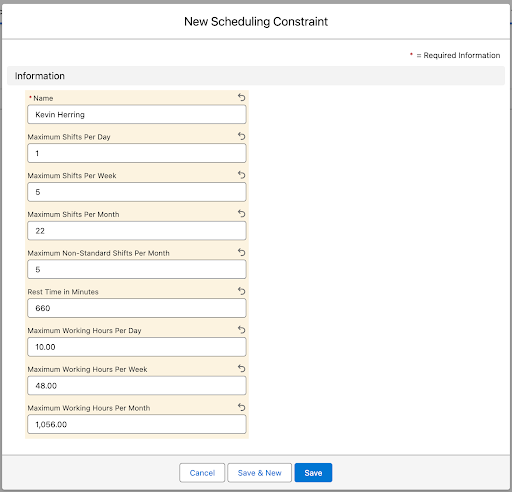The purpose of this document is NOT to provide legal advice to customers. Customers should consult with your own legal specialists on employment law and data protection to determine your respective legal rights and obligations and in particular e.g. to identify the appropriate legal basis for the processing of work time related data of your employees and the scope of consultation or co-determination rights of the workers’ council at the complicated intersection of employment and data protection law.
As one of your Product Managers for Salesforce Field Service here in the EU, I’m sometimes asked how to leverage product features to address the EU Working Time Directive (WTD) 2003/88/EC which sets minimum health and safety standards for the organization of working time across the EU. It aims to protect workers by regulating daily and weekly rest periods, breaks, annual leave, and maximum weekly working hours, and how employers keep records. The implementation of the WTD varies slightly from country to country and one of the more stringent can be found in Germany, where the Workers’ Councils (Betriebsräte) play a significant part. Salesforce Field Service can help customers do more than just tick boxes for the WTD by helping customers build a Field Service Management (FSM) solution that is sustainable and satisfies their field service team’s needs.
Germany’s Arbeitszeitgesetz (ArbZG) takes the WTD and sprinkles in its own unique, often quite precise, flavour. Workers’ Councils, for instance, aren’t just there for a chat; they have significant co-determination rights on matters like working hours, shift planning, and even the introduction of new systems that might impact how employees work. This means any impactful FSM solution needs to be more than just a scheduling tool – it needs to be highly transparent, and allow flexibility and iteration. In short, any FSM solution needs to be thought of as a partner to help you achieve your compliance goals.
Let’s dive into some of the technical nitty-gritty and how Salesforce Field Service can deliver more value.
Salesforce Field Service sees there are two distinct but overlapping parts to empowering you to meet your compliance goals. In the months and weeks leading up to the day of service the shifts of the field workers must be planned. Then, in the weeks and days before the day of service work must be assigned in order for it to be executed. In short the first deals with when the field worker is working and the second deals with what they are doing.
Shift Planning
My colleague, Simon Kuntz, wrote a great post on Shift Management, so please check that out for more detail on the shift planning process.
When planning shifts in advance, fairly rigid shift patterns can be predefined, or you can use Salesforce Field Service shift scheduling logic to dynamically determine the ‘best’ person for the shift based on shift details. Crucially several constraints can be added at the individual or Service Territory level (which can be used to apply different values per country) which enables a high degree of granularity and flexibility:

Operating Hours can also be defined at the individual or Service Territory level to specify regular working hours, which are then added to assigned shifts.
Shift Types: Different shift types can also be used to control the type of work assigned to a field worker.
- Normal – permits any job that the field worker is qualified to work based on work rule criteria to be scheduled during time of this shift
- Extended – allows scheduling any job if overtime is permitted, based on the resource availability rule for the resource. If “minimize overtime” is included in the policy, scheduling to the resource during this shift time is aimed to be minimized.
- Designated – only appointments that meet record set filter criteria can be assigned to the resource during this time
Non-Standard Shifts: Optionally, Salesforce Field Service provides a feature known as “non-standard shifts” which allow you to flag shifts that are not desirable, i.e., not sought by field workers for various reasons such as inconvenient hours or increased workload. Identifying and marking shifts as non-standard helps your planners assign shifts in a more equitable and balanced way either manually or by using the Limit Non-Standard Shifts rule, which can help reduce worker dissatisfaction and attrition.
Scheduling
At the heart of Salesforce Field Service is our intelligent scheduling engine. This is so much more than manual drag-and-drop; it’s a sophisticated algorithmic powerhouse. You can configure it with granular Work Rules and Scheduling Policies that can help our customers to meet the ArbZG’s stipulations.
Assigning Work in Shift: Work should only be scheduled during shift hours. Salesforce Field Service’s automated tools cannot assign work outside of this time. Whilst it may be possible for a dispatcher to override this, they will be warned of any such rule violation.
Daily Max Hours and Daily Max Jobs: The maximum number of work, set either by time or number of jobs, can be set via a Count Rule.
Lunch breaks: Mandatory flexible breaks (e.g., 30 mins after 6 hours, 45 mins after 9 hours) are baked into schedules. Up to three breaks can be scheduled per day using Enhanced Work Rules.
On-Call & Overnight Working: Following an on-call dispatch it may be necessary to block out additional rest time before the start of the next shift. Blocking out time to ensure adequate rest may mean a knock-on effect to the jobs in the rest of the day, that can be rescheduled automatically using optimization.
Time Tracking & Reporting
Following recent German court rulings, precise time recording is paramount. The Salesforce Field Service mobile app transforms into a digital time clock, enabling technicians to accurately record:
Clock In/Out: Simple, yet critical for establishing the start and end of working days.
Breaks: Clearly delineated break periods.
Travel Time: Crucially, travel from a technician’s home to the first job, or between jobs, is often considered working time in Germany. Our app’s integration with mapping and routing capabilities allows for precise capture and logging of this time, ensuring it contributes correctly to overall working hours. No more guesstimates! You can explore these capabilities further in our Field Service Time Sheets documentation.
Other Considerations
FSM solutions often track the real-time (or near real-time) locations of field workers. Workers and their Workers’ Councils can be sceptical about why this is needed. There can be a “big brother” concern however, in our experience, proactively including the Workers’ Councils in the decision making process and change management can be very helpful when trying to reach agreement with them. The reasons for tracking field workers include:
- Emergency work can automatically be scheduled to the closest worker.
- Employers have a duty of care to their field workers, and location data can help enhance their safety through features like last known location, movement detection (or lack of), and panic alarms.
- Field workers can be prompted to perform actions based on their location. For example, their Work Order status can automatically be set to “on-site” when within a certain distance of the work to be completed.
- Customers can be notified more accurately of an approaching field worker, ensuring that they are ready to greet the worker.
- Searching for parts can show the nearest stores or colleagues with the needed parts.
- Auditing can be more reliable, e.g., the field worker is by the correct asset that they are maintaining.
User Control is key: Field workers always retain the ability to manually disable location tracking via their mobile device’s operating system settings (iOS, Android). This user-centric design respects privacy rights. You can find more details on tracking service resource geolocation.
Conclusion
Workers’ Councils Agreement is KEY: Any deployment of a FSM in Germany and other EU member states must involve consultation and agreement with the applicable Workers’ Councils. Transparency about what data is collected, why, when, and how it’s used is fundamental to obtaining their consent and avoiding potential legal issues. It’s about trust, not tracking.
In summary, Salesforce Field Service is more than just software; it’s a strategic ally in navigating the world of EU and German working time regulations. It equips you with the tools to systematically aid your compliance, meticulously track relevant field workers’ data, empower your field workers, and build strong, trusting relationships with your Workers’ Councils. So, let’s turn those regulatory challenges into operational triumphs!









